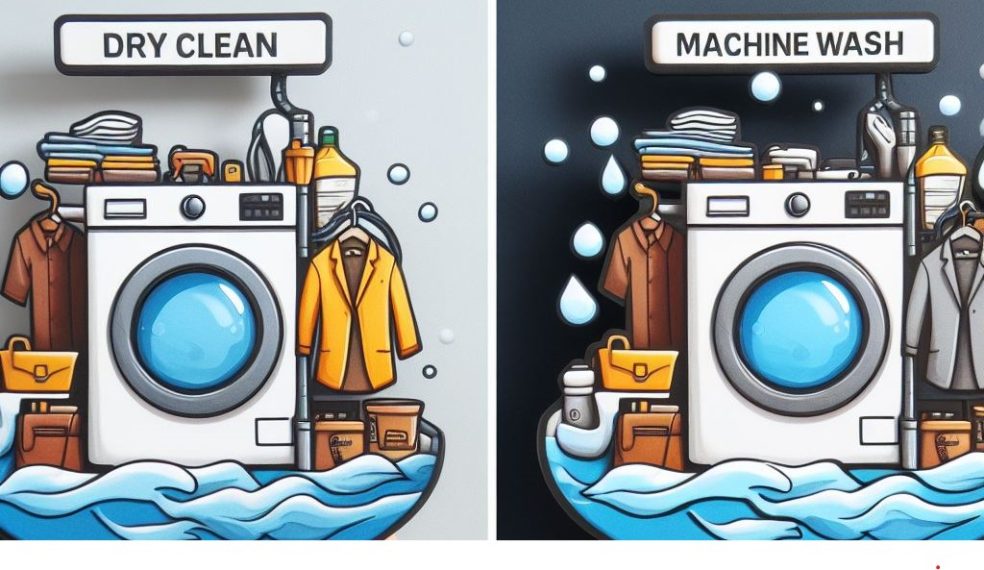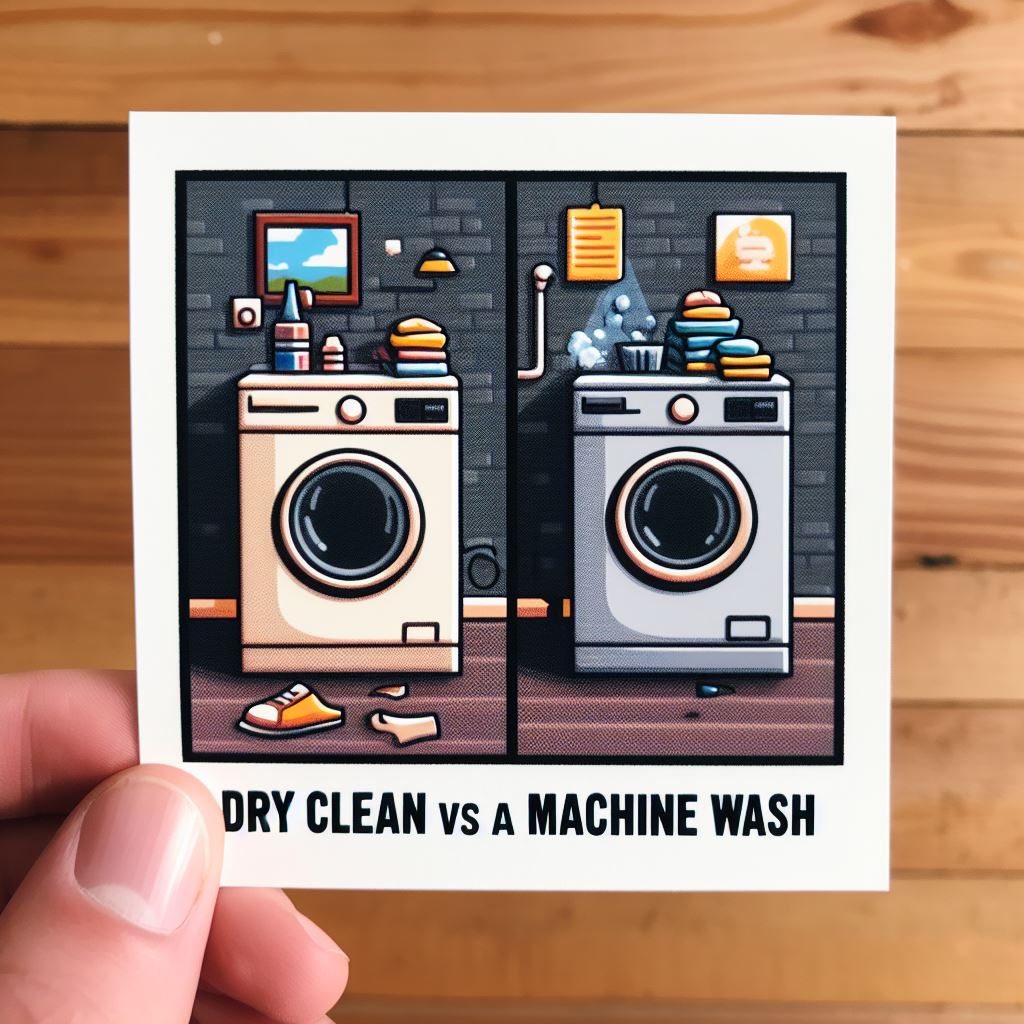
Choosing between dry cleaning and machine washing can be a conundrum with our precious garments at stake. Did you know that incorrect washing methods can seriously damage certain types of fabrics? This blog post breaks down the fundamental differences between the two cleaning techniques, helping you make an educated decision based on fabric type, stain, and durability considerations.
Hang tight because we’re diving deep into the world of laundry; your clothes will thank you!
Key Takeaways
- Dry cleaning uses chemical solvents to treat grease and oil stains without causing shrinkage or fading, while machine washing typically involves water and detergent.
- In the dry cleaning process, clothes are tumbled in an industrial machine to evaporate the solvents and prevent wrinkles. Machine washing involves spinning clothes at high speeds to extract excess water before air-drying or heat drying.
- Machine washing is suitable for common stains like dirt or food spills, while dry cleaning is more effective for tough stains like ink or lipstick from delicate fabrics.
- Washing at home is convenient and cost – effective, but may not be suitable for delicate fabrics or tough stains. Dry cleaning offers gentle treatment and effective stain removal but can be expensive and potentially harmful due to toxic solvents.
The Main Differences Between Washing and Dry Cleaning
The provided text discusses the main differences between washing and dry cleaning, focusing on four key aspects: solvents used, drying method, the overall process, and stain removal techniques. Let’s go through each point to ensure accuracy and clarity:
Solvents Used
- Dry cleaning primarily uses chemical solvents, with perchloroethylene being a common one, which is effective for grease and oil stain removal without causing fabric shrinkage or fading.
- Washing employs water and detergent to clean, with water being less efficient at removing oil-based stains.
Drying Method
- In dry cleaning, a process called “tumbling” is used, where clothes are rotated to allow solvents to evaporate, aiding in wrinkle prevention.
- Machine washing involves a water-based cleaning cycle followed by spinning at high speeds to extract water, with different fabrics possibly requiring various heat levels during air-drying or heat drying.
Process
- Dry cleaning is a water-free process that saturates clothes with perchloroethylene, followed by tumbling and solvent removal.
- Machine washing uses detergents and water, with a focus on stain removal through agitation and controlled heat settings according to fabric type.
Stain Removal
- Machine washing is suitable for common stains like dirt or food spills due to the agitation and water in the washing machine.
- Dry cleaning is more effective for tough stains like ink or lipstick due to the use of chemical solvents without water.
Pros and Cons of Washing vs Dry Cleaning
Washing clothes at home can be convenient and cost-effective, but it may not always be suitable for delicate fabrics or tough stains. On the other hand, while dry cleaning offers a gentle approach and effective stain removal, it can be expensive and potentially harmful due to toxic solvents.
To determine which method is best for your garments, consider factors like fabric type, stain severity, and durability. For more detailed information on the pros and cons of washing versus dry cleaning, visit our blog!
Benefits of Washing
Washing your clothes in a washing machine offers several benefits. Firstly, it effectively removes dirt, stains, and odors, leaving your garments clean and fresh. Additionally, machine washing is a convenient option, as you can simply toss your clothes into the washer and let the machine handle the cleaning process.
It also saves time compared to dry cleaning since you don’t have to wait for the items to be professionally laundered. Moreover, washing fabrics at home using water-based detergents is generally considered safe and less harmful than using toxic solvents in the dry cleaning process.
Overall, machine washing is an efficient and cost-effective way to keep your everyday clothing clean and well-maintained without any hassle or extra expense.
Drawbacks of Washing
Washing your clothes in a washing machine can have its drawbacks. One of the disadvantages is that certain fabrics, especially delicate ones like silk or wool, can get damaged in the process.
The agitation and tumbling action of the machine can cause shrinkage, stretching, or even tearing of these sensitive materials. Another drawback is that some stains may not come out completely with regular washing methods.
Tough stains like oil or ink may require more specialized treatments to be effectively removed. Additionally, excessive machine washing over time can also cause colors to fade and garments to lose their shape and texture.
Benefits of Dry Cleaning
Dry cleaning offers several benefits over traditional machine washing. Firstly, it is highly effective at removing stubborn stains that regular laundry methods may struggle with. The use of specialized solvents and chemical solutions in the dry cleaning process allows for thorough stain removal without damaging delicate fabrics or garments.
Additionally, dry cleaning eliminates the risk of shrinking or discoloring certain types of clothing, making it ideal for maintaining the quality and appearance of your favorite pieces.
By following the proper washing instructions and opting for dry cleaning when necessary, you can extend the lifespan of your garments and ensure they always look their best.
Drawbacks of Dry Cleaning
Before you send your favorite garments off to be dry cleaned, it’s important to consider the drawbacks of this cleaning method. Firstly, dry cleaning can be quite costly compared to machine washing.
The process itself requires special equipment and solvents, which are expensive to use. Additionally, some chemicals used in traditional dry cleaning methods can be harmful to both the environment and human health.
Lastly, certain delicate fabrics may not hold up well under the harsh treatment of dry cleaning chemicals and processes, leading to potential damage or discoloration.
Determining Which Method to Use
When deciding how to clean your garments, it’s crucial to take into account the fabric type, the nature of the stains, and the durability of the garment. These factors will guide you in choosing between washing and dry cleaning.
Fabric Considerations
Before making a choice between washing and dry cleaning, you must consider the type of fabric your garments are made from. Different fabrics come with distinct care requirements. Understanding these considerations will help you select the appropriate cleaning method.
Delicate fabrics, such as silk, wool, or lace, often require dry cleaning to prevent damage that might occur during machine washing. In contrast, sturdier fabrics like cotton or polyester can usually be machine-washed without any issues. By taking into account the fabric’s characteristics and specific care instructions, you can ensure that your clothes are cleaned effectively while preserving their quality and longevity.
Stain Type
The type of stain can significantly impact your choice of cleaning method. Some stains are better suited for either machine washing or dry cleaning. For instance, oil-based stains like grease or motor oil may be more effectively removed through dry cleaning due to the use of chemical solvents. On the other hand, water-based stains, such as coffee or juice, may respond better to traditional machine washing with detergent and water. Understanding the nature of the stain can help you decide whether it’s best to wash or dry clean your garments for optimal stain removal results.
Durability
Machine washing can be tough on certain fabrics, reducing their durability over time. The agitation and tumbling in the washing machine can cause wear and tear, especially on delicate materials. In contrast, dry cleaning is a gentler option that helps maintain the longevity of your garments. By using chemical solvents instead of water, dry cleaning doesn’t subject fabrics to harsh mechanical action. This makes it particularly suitable for delicate or heavily embellished items that may not withstand the rigors of machine washing. When considering durability, it’s essential to choose the right cleaning method for your specific fabrics and garments to ensure they last longer.
Conclusion
The choice between washing and dry cleaning is a crucial decision that directly impacts the longevity and appearance of your clothing. Understanding the key differences between these cleaning methods is essential for making informed choices. Machine washing is a convenient, cost-effective, and generally safe option for everyday fabrics, efficiently removing dirt, stains, and odors. However, it may not be suitable for delicate materials or tough stains, and excessive machine washing can lead to fabric damage over time.
On the other hand, dry cleaning excels in stain removal and is gentle on delicate fabrics, preventing shrinkage and discoloration. Still, it can be expensive and environmentally concerning, and it may not be necessary for every garment. To make the best choice, consider factors such as fabric type, stain nature, and garment durability. By doing so, you can ensure that your clothes are well-cared for and maintain their quality and appearance for years to come. So, whether you choose the convenience of machine washing or the effectiveness of dry cleaning, your clothing will thank you for the care you provide.
FAQs
1. What is the difference between dry cleaning and machine washing?
Dry cleaning uses a chemical solvent to clean clothes, while machine washing involves water, detergent, and agitation.
2. Can I dry clean all types of clothing?
While most garments can be safely dry cleaned, certain delicate fabrics or those with special care instructions may not be suitable for dry cleaning. Always check the garment’s label or consult a professional cleaner.
3. Is machine washing more effective than dry cleaning?
The effectiveness of either method depends on the type of fabric and the specific stains or dirt present on the garment. Some stains are better removed through dry cleaning, while others may require soaking and agitation in a washing machine.
4. Which method is more cost-effective: dry cleaning or machine washing?
Generally, machine washing tends to be less expensive than frequent trips to the dry cleaner. However, it is important to consider factors such as time, convenience, and potential damage to delicate garments when deciding which method is more cost-effective for you.
5. How do I determine whether a garment should be dry cleaned or machine washed?
Always refer to the care label on your garment for specific instructions from the manufacturer regarding proper cleaning methods. If there are no instructions available or if you are unsure about how to proceed, consult with a professional cleaner for guidance.
